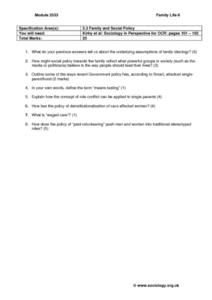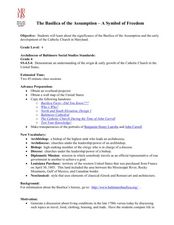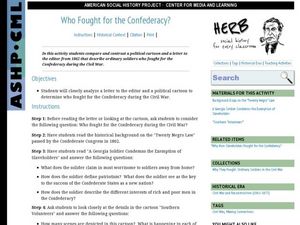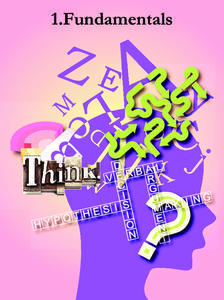Teaching Tolerance
Using Photographs to Teach Social Justice | Supporting Social Border Crossings
A lunch-time activity encourages pupils to step out of their usual lunch bunch and connect with someone new. To begin, individuals examine a group photograph and identify what they believe is the gender, race, religion, and sexual...
Teaching Tolerance
Using Photographs to Teach Social Justice | Affirming Our Commonalities and Differences
Photos can challenge stereotypes. To gain an understanding of the big picture, groups examine a series of photographs and analyze how a photographer's choices can shape a viewer's reaction to an image. For the first set of photographs,...
Curated OER
Socialism vs Capitalism
Students engage in an activity to show the differences between Socialism and Capitalism. In this socialism and capitalism lesson, students break into groups and are given scenarios to analyze. Students respond to each scenario and list...
Facing History and Ourselves
Transcending Single Stories
The focus of the second lesson in the Standing Up for Democracy unit is on the power of assumptions based on a single experience or point of view. Class members begin by journaling about assumptions others make about their identity based...
Curated OER
Creating Social Stories
Developmentally disabled students participate in the creation of their own social stories. They select a topic for their social story and work with the teacher to write a social story or create a video social story presentation.
Facing History and Ourselves
Why Little Things Are Big
Often our decisions are impacted by a fear of how others see us. That's the big idea in a two-day lesson that asks how false assumptions, how our fear of how others may see us, impact how we act. After watching a video about such a...
Education Bureau of Hong Kong
Mental Models
Behaviors are often based on assumptions. That's the big idea in the third lesson of a series of critical think resources. Through a series of worksheets, learners examine the conscious and heretofore unconscious assumptions that...
Curated OER
Family and Social Policy
Review main topics relating to family and social policy using this resource. Learners answer eight questions related to the theories behind certain social policies.
Curated OER
Anti-Bullying Efforts in the Elementary Classroom
Help prevent bullying from ever beginning with these simple strategies for implementing class meetings.
Curated OER
What Can We Learn From the Past?
What would future archeologists learn from your scholars' personal belongings? Have them bring in a box of "primary sources" from their home. Discuss the difference between observations and inference, using some of your own items to...
Curated OER
Stereotypes
Assumptions and misconceptions are two things that underlie stereotypes. Introduce youngsters to the concept of stereotyping with a role-play activity. They pretend they are employees at a restaurant who have accused a person of...
Curated OER
Social Boundaries Activity: Map It Out
Students observe the school for one week to identify social boundaries. In this map it out activity, students sketch the school's social boundaries, identifying where social cliques hang out. Students compare their viewpoints and...
Curated OER
Lesson 12: What Reasonable Conclusions are Possible?
Oftentimes, we jump to conclusions when we are given a limited amount of information. Take a look at reasonable conclusions with your communications studies class. If-clauses, dichotomous thinking, and assumptions are all covered with...
Curated OER
Understanding Stereotypes
Pupils confront age-related stereotypes, explore how stereotyping impacts their lives, and discuss how they can make changes to reduce over-generalizations, unfair assumptions, and critical judgments about people groups. They use a...
Annenberg Foundation
Gothic Undercurrents
Terror, mystery, excitement. American writers of the 19th century, including Nathaniel Hawthorne, Herman Melville, and Emily Dickinson, used these elements to create morally ambiguous tales that challenged the prevailing belief in...
Curated OER
The Basilica of the Assumption-A Symbol of Freedom
Fourth graders explore the importance of the Basilica of Assumption and the development of the Catholic Church in Maryland. In this social studies lesson, 4th graders discuss the Basilica of the Assumption and the Catholic Church.
Education Bureau of Hong Kong
Mental Models
Critical to responsible decision making is becoming aware pre-conceived notions and biases that influence our perceptions. A colorful slide presentations asks viewers to consider these mental models that factor into their assumptions and...
Alabama Department of Archives and History
Alabama's 1901 Constitution: What Was at Stake?
Who should be able to vote? As part of a study of the 1901 Alabama Constitution, class members examine primary source document that reveal the reasons the authors gave to support their positions on this question and their assumptions in...
Reading Through History
Ain't I a Woman?
Sojourner Truth’s “Ain’t I a Woman?” speech has reverberated through American history, giving voice to women of color who had not previously been heard. Learners analyze the tone, audience, purpose, occasion, and speaker of the speech’s...
Curated OER
Who Fought for the Confederacy?
Did the Confederate Army really consist of southern volunteers? Using primary sources, historians examine the story behind the "Twenty Negro Law" and realities of conscription during the Civil War. A letter and a lithograph (included as...
Advocates for Human Rights
The Right to Workers in United States
To raise awareness and understanding of modern-day slavery, class groups research the various forms of slavery, including human trafficking, read and reflect on case studies, and design a plan of action for their community.
Facing History and Ourselves
Identity and Labels
Scholars look at the connections between identity and labels, assumptions, and stereotypes, in a lesson that examines identity in the United States. To set the stage for a discussion of these connections, class members analyze a cartoon,...
Facing History and Ourselves
Unit Assessment: From Identity to Action
Four projects enable class members to show what they have learned about ways they can stand up for democracy. to begin, individuals review their identity charts and craft a mask that represents themselves. Next, groups create a short,...
Education Bureau of Hong Kong
Fundamentals
"Fundamentals," the first lesson in a series of eight, introduces the basic concepts and strategies covered in a series of resources designed to teach high schoolers critical thinking skills. The worksheets and activities in this first...

























